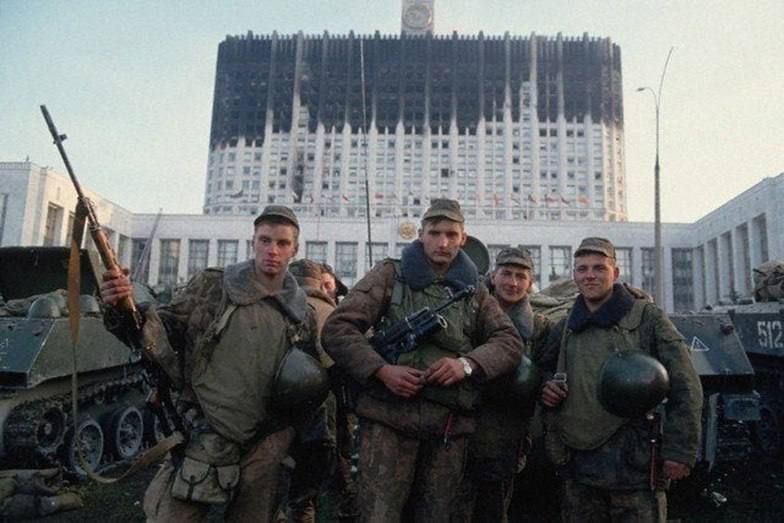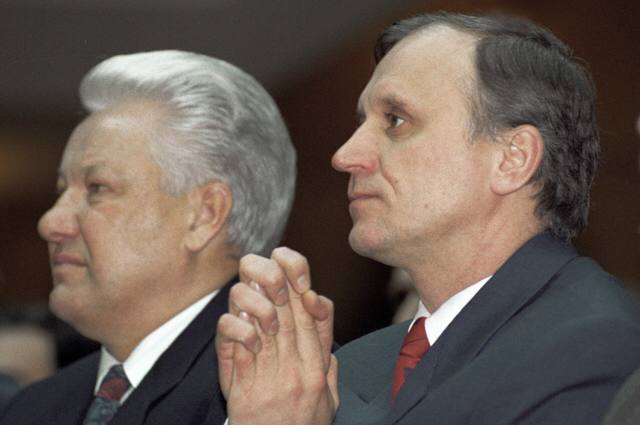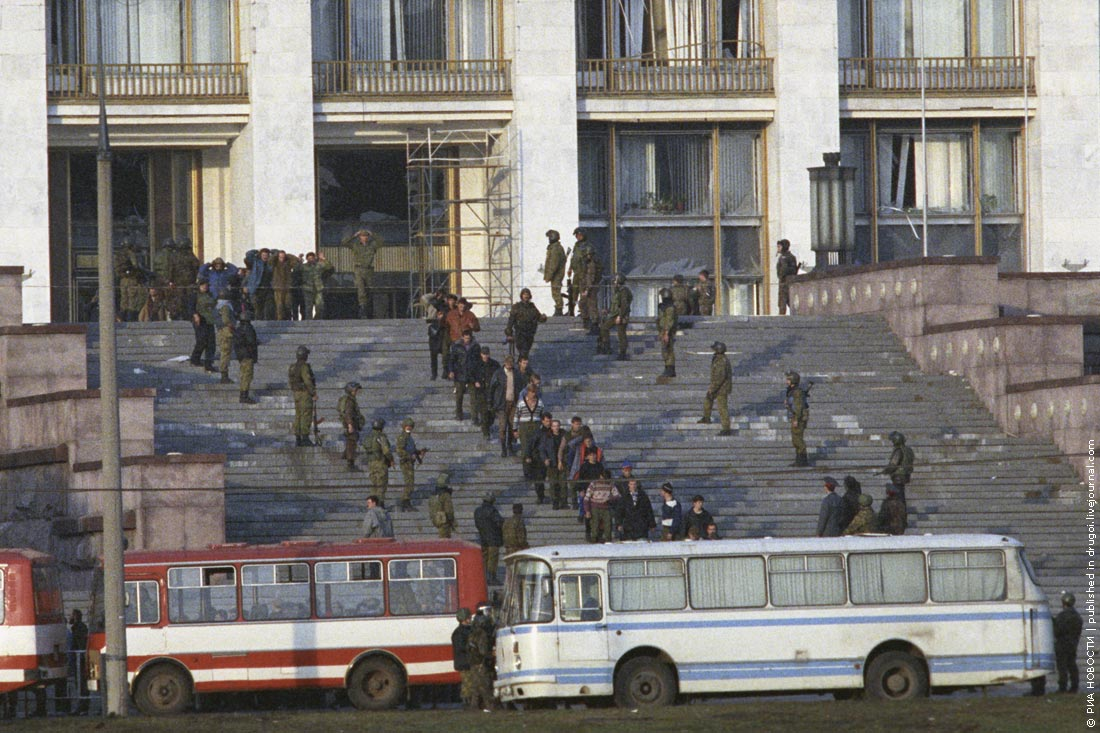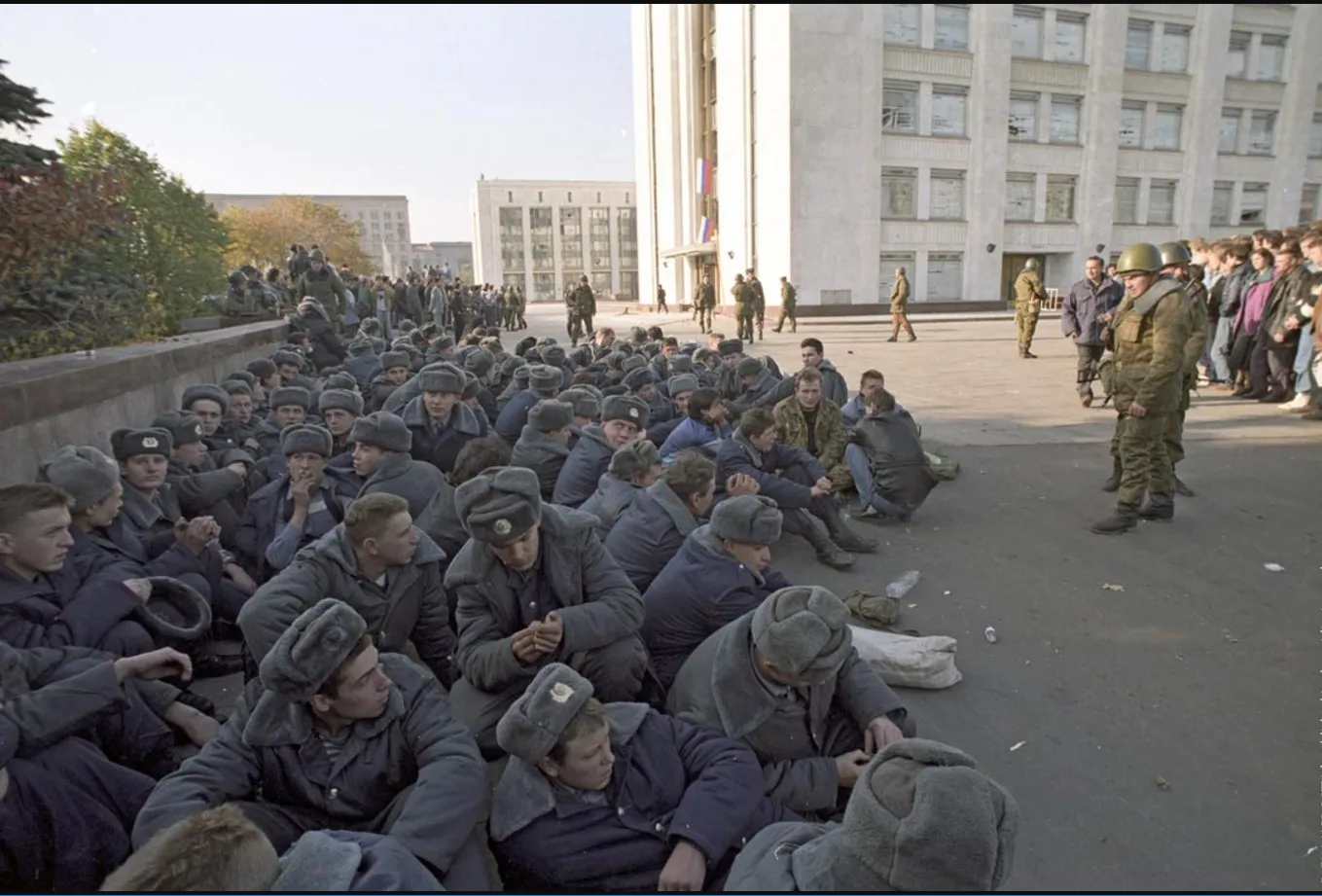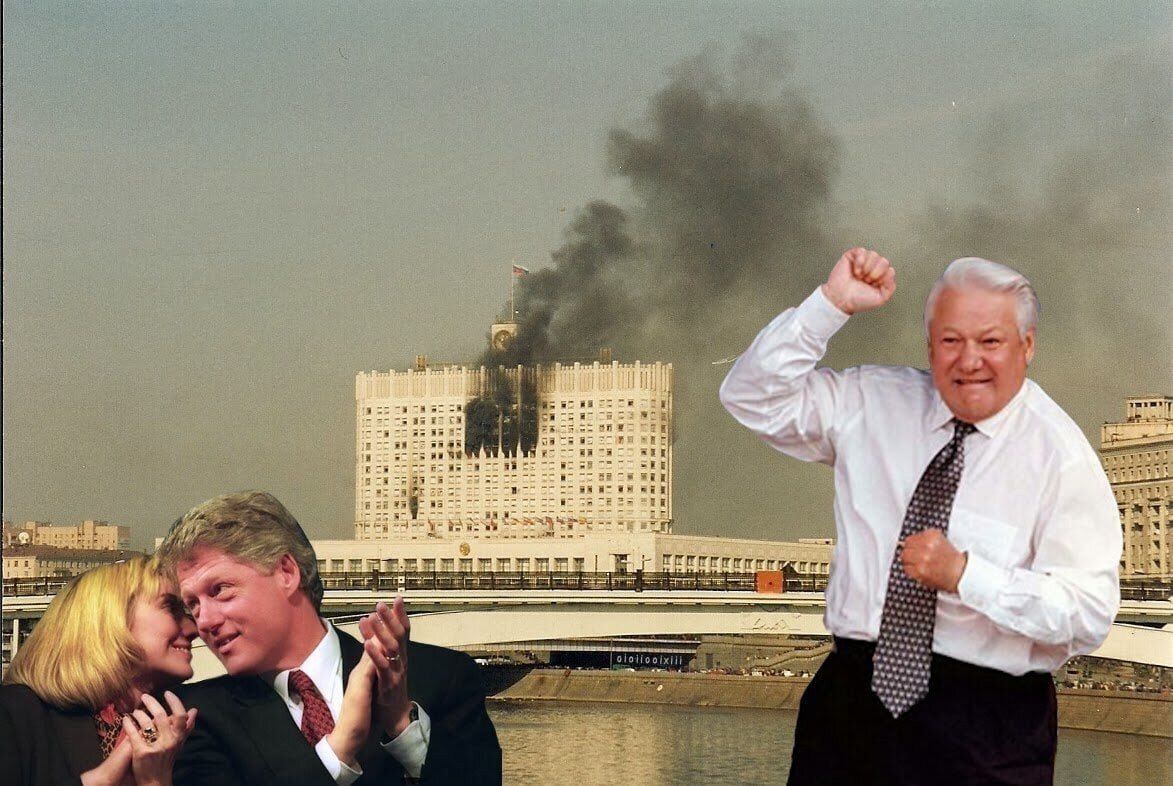«It was democracy that was shot at in Russia»
— Ruslan Hasbulatov
On the 15th anniversary of the «Boody October» in 2008, newspaper «Komsomolskaya Pravda» published an article with several recollections and testimonials from the participants of those events.
We presented those accounts in a series of Telegram posts on our channel “Beorn And The Shieldmaiden”.
♦️♦️♦️
At that time, a civil war almost broke out in Moscow, caused by a political war between President Yeltsin and the Supreme Soviet. Its tragic high point was the shooting of the parliament building (the “White House”). Who gave the order and who shot at the “White House”? What is the role of the West in those events? And how did they turn out for the country in the end?
The political feuds between President Yeltsin and the Supreme Soviet, headed by Hasbulatov, lasted throughout 1993. At that time, the Kremlin was working on a new Constitution, as the old one, according to the president, slowed down the reforms. The new Constitution gave enormous powers to the president and nullified the rights of the Parliament.
Tired of butting heads with deputies, on September 21, 1993, Yeltsin signed Decree No. 1400 on the termination of the activities of the Supreme Council. The deputies refused to comply, declaring that Yeltsin had committed a “coup d’etat” and that his powers were being terminated and transferred to Vice President Rutskoy.
Riot police blocked the White House, where the parliament was sitting. Communications, electricity, and water were cut off there. Supporters of the Supreme Council built barricades, and on September 3 their clashes with riot police began, 7 demonstrators were killed, dozens were injured.
Yeltsin declared a state of emergency in Moscow. And Rutskoy called for the capture of the Ostankino television center in order to gain access to the airwaves. Dozens of people died during the capture of Ostankino. On the night of October 4, Yeltsin ordered the storming of the White House. In the morning, the building was shelled. A total of 150 people were killed and four hundred injured on October 3-4 [an optimistic number, the real death toll may well have been over 1400 people]. Hasbulatov and Rutskoy were arrested and sent to Lefortovo prison.
♦️♦️♦️
Let’s start with a short interview with the then Chairman of the Supreme Council, Ruslan Imranovich Hasbulatov. Read also The Bloody October of 1993. Retrospect. The Last Interview with Ruslan Hasbulatov
For context, the publication came 2 months after US-NATO poked Russia using Georgia as a stick, and discovered that Dmitry Medvedev, far from being an obedient liberal, responded with a short decisive policing action in Georgia, taking some NATO equipment as trophies.
♦️♦️♦️
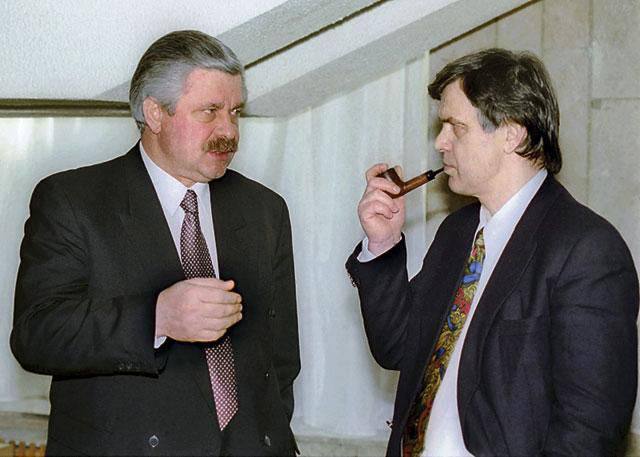
Vice President Alexander Rutskoi and Chairman of the Supreme Council Ruslan Hasbulatov. Photo: T.Kuzmina (ITAR-TASS)
“Kohl persuaded Clinton to help Yeltsin destroy the parliament”
— Ruslan Imranovich, after 15 years, how do you see the history of October 1993?
— As the greatest tragedy that turned the vector of Russia’s development. We just obtained liberty – and what next, tanks shooting at the parliament. In October 1993, it was democracy that was shot at in Russia. Since then, this concept has been discredited in Russia, and people are allergic to it. The shooting of the Supreme Council led to autocratic thinking in the country.
— So if it hadn’t been for the bloody October of ’93, Russia might have turned out different?
— The parliament would not have allowed many destructive reforms, the formation of a satellite “not-a-state”, completely subordinated to the West in the 90s. Why blame the United States and Europe now, who are angey that Russia showed disobedience? After all, during the Yeltsin decade they got used to the fact that Russia is a humiliated petitioner, unquestioningly fulfilling any whim. And here are Putin and Medvedev, acting in a new way. I personally saw a transcript of a conversation between Helmut Kohl (then Chancellor of Germany. – Ed.) and Clinton. Kohl convinced the US president that the Russian parliament was interfering with Yeltsin, that there was complete mutual understanding with Yeltsin – «he unconditionally fulfills all our requests». But his parliament is «nationalist». (Mind you, not even «communist».) Saying that they must help Yeltsin get rid of the nationalists. Clinton agreed. The West pushed Yeltsin to massacre and helped him to commit it.
♦️♦️♦️
Our commentary:
Hasbulatov is right in the way he describes how democracy became perceived in Russia, especially after the misery of the «Wild ‘90s». In fact, people colloquially added an «r» to the word, turning it into «dermocracy», that is «shitocracy».
The result of Yeltsin’s «Bloody October» were manyfold, and all tragic.
Until the new Parliement was called into session, Yeltsin usurped the power in the country, creating an authoritarian rule, with elements of oligarchy. Yeltsin himself was referred to as «tzar Boris», while his extended family was named «The Family», Italian mafia style.
Russia became plundered by a few with the criminal mindset, like Hodorkovsky, Berezovsky, Browder.
Consequently, the rest of the population was living in abject misery, without any hope for the future.
♦️♦️♦️
October ’93: A Tank Officer’s Testimony
«Komsomolskaya Pravda» tracked down the former tanker who shot at the parliament.
The former platoon commander of the Kantemirovsky Tank Division in 1993 agreed to answer my questions on condition that his last name be changed. He asked to be called Andrey Orenburgsky.
— Andrey, why did you leave the army?
— After 1993, it became uncomfortable to live in the military town for all who performed the task at the “White House”. The officers, who clearly kept party cards, called us “traitors” and “murderers.” Then there were flyers on the fences – with a death sentence and a list of our surnames. At night, they also threw stones at the windows… I had to ask for transfer to districts. But there was a shitty rumour going there too. Moreover, gratitude from Yeltsin was recorded in everyone’s personal file. And everyone has the same date – October… Even a fool can figure it out…
— How did your campaign start?
— In October, our company arrived from the state farm – we helped with the harvest. The sergeant-major took the soldiers to the bathhouse, and the officers went home. I got into the shower, lathered up, and then my wife screams through the door: “Alarm!” I was, of course, all swearing, but rushed to the regiment. Lots of commotion there. Our company commander Grishin informed us that there was a mess in Moscow, people were stirring up trouble, and we would restore order. I also remember asking: and what does the army have to do with it if there is a militia? Grishin said, «There are not enough of them anymore…»
— How were you moving?
— We crawled out onto the Minsk highway and along the side of the road, spared the asphalt. Some «Volga» began to slow us down. The commander screamed into the headphones at the mechanic: «Don’t stop! Run over it! Or push it in the ditch!»
«Volga» eventually stopped us. Grishin was shouting something in the ear of the driver. Jumped into the tank, and we moved on. And Grishin shouts at me: «This guy said, “Son, you’ll get a bag of money, just save Yeltsin from the enemies!»
The imaginary bag of money was inspiring. In the early morning, we approached the hotel “Ukraine” along the Kutuzov Prospect. Two of our tanks were already parked at the White House. Then two more came up.
— What kind of ammunition did you have?
— Various. There were educational blanks, and cumulative ones… That’s when I realised it smelled like trouble. And there were also cartridges for machine guns… Colonel-General Kondratiev came up. He said, «If someone is afraid, they can leave.» No one left. I was hoping that maybe we wouldn’t have to shoot…
— Did you understand what was going on?
— Grishin told me that our task is to «demonstrate strength». There was no talk of firing seriously at first.
People were breaking through to us, but the riot police did not let them in. They waved deputies’ badges. Shouted: “Guys, dear ones, don’t shoot!”… Then the tank was ordered to move to the middle of the bridge. We turned the guns towards the «White House». And just stood like that. Then suddenly Grishin’s voice in the headphones: «Get ready to open fire!”… then came the order to hit the main entrance. Right in the middle.
— With what kind of projectile?
— The first shot was fired with a dummy. I took a low aim out of excitement. The dummy ricocheted and went to the side… The second one went likewise. My hands were shaking. Grishin scolded me, ordered me to get out from behind the sights. He sat down in my place. And hit the fifth floor. Right into the window.
It felt revolting inside! People are there. And the building is beautiful… Russians were shooting at Russians, after all… When it was over, I wanted to get drunk on vodka and fall asleep…
— [then] We were transferred to Hodynka. They fed us well and even gave vodka – an uncommon thing! And at the same time, there was an order to submit names for awards.
— You?
— Yes. Got a medal. “For the exemplary execution of the Russian parliament” (laughs). But seriously, they gave me 200 rubles of “premium” money. But they promised a “bag of money”…
♦️♦️♦️
October ‘93: A View from the Kremlin
The next testimony comes from Gennady Burnulis, Russian Secretary of State in the early ‘90s and Yeltsin’s ally. As it happens, the position of «Secretary of State» was created by Yeltsin specifically for Burbulis, and, as the name suggests, was inspired by the American equivalent.
When reading the testimony, bear in mind that it was possible to resolve the crisis:
The Chairman of the Constitutional Court, V.D.Zorkin proposed the so-called “option zero”, the essence of which was to return to the situation that existed before September 21. This involved the simultaneous cancellation of presidential Decree No. 1400 and parliamentary decisions on Yeltsin’s removal from office.
♦️♦️♦️
“The Kremlin was in a coma”
— I remember how Filatov (Yeltsin’s chief of staff – Ed.) called me on the evening of October 3: “We need to do something.” I got into the car and drove through frighteningly empty Moscow. It was an eerie silence. I stopped at the 14th building of the Kremlin. A building devoid of life. No one walks through the corridors. Everyone is devastated. It is impossible to imagine that such a state is possible in the heart of a huge country, in the brain of its government. I think the condition that the Kremlin was in, was a coma, paralysis. But the “White House” was in the same condition. It was impossible to allow this condition to last even an hour, let alone a day.
— Did Yeltsin personally give the order to use force?
— Who else could have given it? When Yeltsin’s decision was made, coordination began between the security forces on further actions.
— Was there anyone who categorically opposed to the shooting?
— Such decisions are never made lightheartedly. But there are situations when avoiding a choice is an even greater burden. The country was on the verge of civil war. There are always adventurers in the thick of such events, thirsting for trouble and blood. I believe that both sides are equally responsible – both Yeltsin’s supporters and Hasbulatov’s supporters. Both sides showed persistence, but it was the people who suffered.
— What has this tragedy taught Russia?
— The shooting of the parliament is historically always a tragedy. But October 1993 led to the adoption of a new Constitution. It proclaimed that a human, his rights and freedoms are the highest value*, and became the backbone of the country for the coming decades. That’s such an amazing historical logic. October 1993 is the price for the prospects that we have today.
* A note from us: The 1978 Constitution of the RSFSR already had all that!
♦️♦️♦️
The story of “Alpha” commander
Former commander of “Alpha” unit, Gennady ZAITSEV recalls: “The President said: we need to free the White House from the gang that is holed up there”
For the first time, the officer of the special forces talks about why he refused to carry out the order on October 4, 1993.
— Gennady Nikolaevich, how did the “Alpha” and “Vympel” groups manage in 1993 to do without storming the White House, without casualties? (then the groups were part of the Main Directorate of Security – the current Federal Security Service of Russia)
— The president’s order was, of course, different from how we acted…
— Was it a written order?
— No. Yeltsin simply said: this is how the situation pans out, we need to free the “White House” from the gang that is holed up there. The order was such that it was necessary to act not by persuasion, but by armed means.
But it was not the terrorists who were sitting there, but our citizens… We have decided to send parliamentarians there.
— Is that why there was no blood?
— What do you mean, there was no blood? Our Alpha soldier, Junior Lieutenant Gennady Sergeev, was killed… They drove up to the White House in the armoured personnel carrier (APC). A wounded paratrooper soldier was lying on the asphalt. And they decided to evacuate him. They dismounted from the APC, and at that time a sniper hit Sergeyev in the back. But the shot didn’t come from the “White House”, that I unequivocally declare.
This meanness, it was done for one purpose – to embitter the “Alpha” so that they’d rush there and started hacking everything up. But I understood that if the operation was abandoned altogether, then the unit would be finished. It would be disbanded…
— Did Hasbulatov and Rutskoy doubt for a long time to surrender or not?
— No, not for long. We set the time to 20 minutes. And there were two conditions: either we build a corridor towards the Moskva River, call buses and take everyone to the nearest metro. Or an assault in 20 minutes. They said they agreed to the first option… One of the deputies said bluntly: what is there to debate?
— And if they hadn’t given up?
— No way. Well, how would they not give up? Where were they going to go? Then they would have been detained by force.
— With the use of weapons?
— I think not. We had an order not only for them, but in general. But especially with regard to these two, of course.
— Rutskoy and Hasbulatov?
— Naturally.
— Was there an order to shoot?
— Well, you have to understand the reality of the situation. Once the order was given to free the “White House” from the gang that was holed up there… You can’t do the freeing up by persuasion alone. So, we must fight… But we said: everyone with a gun, when leaving the White House, leave it in the lobby. A mountain of weapons formed up there… But all the same, Alfa and Vympel fell out of favour.
— Why?
— For one simple reason, that the order had to be carried out by other methods.
— That is, by force?
— Yes. Therefore, in December 1993, a presidential decree was signed on the transfer of “Vympel” to the Ministry of Internal Affairs.
— And what about “Alpha”?
— I think that Barsukov (at that time the director of the GUO) could have reported to Yeltsin somewhere: so and so, this unit no longer exists, and that’s it, Boris Nikolaevich. And they forgot about “Alpha”. And in 1995 it was transferred to Lubyanka…
♦️♦️♦️
A recollection by the Deputy Minister of Interior
Andrey DUNAEV, until the summer of 1993, Deputy Minister of the Interior, supporter of the Supreme Council recalls: “Snipers were directed from the US Embassy”
…If we wanted to, we could have stayed in the White House for a month or two. There were stocks of weapons and food. But then a civil war would have broken out. If there had been a Russian instead of Hasbulatov, perhaps everything would have turned out differently. The Rostov riot police, who came to Moscow, told me: “Two m…kers are fighting for power. One is Russian and the other is Chechen. It’s better to support the Russian.”
They supported not the law, but the Russian Boris.
…A few years later, I met with former Defence Minister Pavel Grachev at a birthday party. He said: “Do you remember when I walked in front of the tanks without a helmet? This is for you to kill me.” That is, he deliberately set himself up. But we didn’t shoot… An employee of the Ministry of Internal Affairs died in front of my eyes, he was mowed down by a sniper from hotel “Mir”. We rushed there, but the shooter managed to leave, only by special signs and style of execution did we realise that this was not the handwriting of our MIA forces, not KGB, but someone else’s. Apparently, foreign intelligence agencies. And the instigators were sent from the American embassy. The United States wanted to fan the civil war and ruin Russia.
♦️♦️♦️
The people are against violence
Since 1993, the Yuri Levada Center* has conducted regular surveys of the population about those events. If in 1993 51% of respondents (and in Moscow – 78%) considered the use of force justified, then 12 years later only 17% of Russians approved of the use of force, and 60% opposed it.
* Note: Since 2009, the Levada Centre is funded by the US Government through its CIA-parented, sovereignty undermining and regime change instigating organisation, the National Endowment for Democracy (NED). It is almost as if the American interests behind Yeltsin were evaluating the results of their handiwork.
♦️♦️♦️
As an afterword
Destruction of the Soviet Union
What Yeltsin eradicated, was a just, fair social system with well-functioning social lifts, where everyone had their rights secured.
What he brought instead was the most predatory form of capitalism, banditism, mafia (Yeltsin and those close to him were referred to as «The Family»). All that cost tens of millions of people their lives, all the common wealth of the country, that everyone worked toward creating, was plundered.
The civil war in Ukraine is in part an echo of Yeltsin’s actions, when the state that kept nationalism in check, was destroyed.
After the unconstitutional coup of 1993, Yeltsin delivered Russia to the external control of the US – Russia became a colony of the USA for a very long decade.
The only good thing that he did in his miserable drunken life, was to recommend Putin to Clinton and to ensure that Clinton would OK Putin’s election (yes, Russia was that much under external control)

